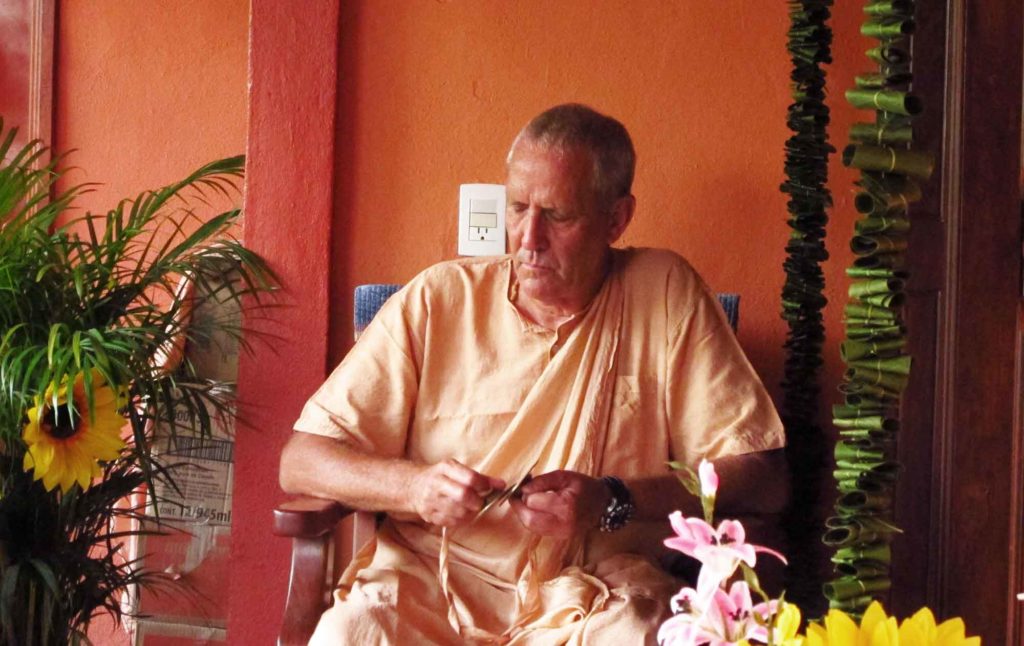Overview
This short article “Does God Exist?” was written in 2000 by Śrīla Narasiṅgha Mahārāja, answering a fundamental question, ‘How do we know that God exists?’
Question: I have a friend who says that you cannot know whether God exists, because you cannot see Him, so he says it is wrong to base your life upon a guess. He also asks why devotees quote the scriptures; aren’t they able to think for themselves?
Answer: The devotees quote the scriptures because the scriptures are the recorded examples of those highly advanced souls and great thinkers who have gone before us in the search to know the Absolute Truth. What they have recorded in their notes, in their doctoral dissertations, that is known as scripture. The experience of what is good and what is to be avoided on the path leading to God consciousness is recorded in the scripture. The words of the scripture are like so many lighthouses showing us the way through the fog or darkness of material conception.
Scripture cannot be understood by persons with a dull brain. Only those with buddhi, or purified intelligence, can understand the scripture. Is it not intelligent to take advantage of knowledge which is already recorded in authorized books? In a court of law, a lawyer will cite the previous cases in the legal annals. Are we to assume that the lawyer has no capacity to think on his own simply because he quotes law books? The doctor also may be found to consult so many medical texts when attempting to cure a patient of a particular disease. Should we then assume that the doctor has no ability to diagnose the patient on his own? Experience shows us that the good doctor and the good lawyer have volumes of related books for their reference. So why should it be any different in the search for God? If relevant textbooks are available, should one not take advantage of such books? The scriptures are written on the basis of personal experiences of those who have had some success in the world of consciousness, God consciousness. The scriptures say, “This has been discovered. Go there are see for yourself.”
A man of scriptural knowledge is indeed a free thinker, a self-thinker. The ability to think for one’s self is in fact a qualification to become God conscious. God consciousness cannot be achieved by the dull brain. What is a dull brain? One who thinks he is the material body made of material elements, he has got a dull brain. Such persons cannot think for themselves because they do not know what the self is. Under the guidance of scripture one becomes self-aware. Then one’s real thinking begins. Then one can think for one’s self.
A person in material consciousness is never a self-thinker, because such persons are always under the mental and physical impressions of the material body, which is false. Only one who has understood the difference between matter and spirit can be a self-thinker. Such persons always take the scripture in close alliance with their practices. It is therefore not a sign of weakness that one quotes the scriptures. Rather, it is a sign of spiritual advancement.
Someone may say that we must prove that God exists. They will say, “Show me God, I want to see Him.” But we will say, “Because you cannot see God does not prove that He does not exist.” Should a blind man say that the Sun does not exist simply because he cannot see it? The blind man cannot see the Sun but his blindness does not disqualify the existence of the Sun.
The argument may be put that the blind man cannot see the Sun but he can feel the Sun’s rays. He can feel the soothing warmth of the rays of the Sun. So we must be able to have some tangible experience of the existence of God before we accept Him fully. That is not unreasonable. Although the material eye has no capacity to see the transcendental form of God, we can nonetheless feel that He exists. Feeling is a higher and more reliable sense than sight. But that feeling is not skin deep, like the perception of the Sun’s rays; it is heart deep. With the feelings of one’s heart one can confirm that God exists. God is on the deepest side of our existence. In the deepest plane of our consciousness, in the core of our heart, His existence can be felt. Indeed, it is a profoundly personal experience, not something for the sightseers of the mundane world. “Show me God!” and He simply dances before your eyes. It is not like that. Many things are required if we want to see God.
It is not unreasonable. First qualify yourself. “First deserve, then desire.” Is there any valuable thing in this world that you can have simply upon demand? Simply saying, “I want to be rich!” Do you become rich? No, many things are required before that. Simply saying, “I want to be a doctor!” Do you become a doctor immediately? No. Then why should one think that the demand to see God should be met immediately? First, deserve, then desire. It is such.
An atheist has no proof that God does not exist, so is it not risky to base one’s life on something which is just a guess? The position of the theist is always more positive than that of the atheist. Let us consider for a moment. There are two men. One is a theist and the other an atheist. Each lives out his life according to his creed, and in the end both men have to die. Let us say for the sake of argument that when the theist dies there is no God. Then what does it matter? He believed in God, but in the end there was no God. So what does it matter? Death comes and life is over, finished, the end. No loss, no gain, it’s simply over.
On the other hand, the atheist dies and he was wrong. There is a God! Then what, what does he do now? It’s too late. He again takes birth in the material world and suffers and enjoys according to the deeds of his past life. So to be an atheist, one has to admit, is quite a risky proposition. The position of a theist is always safer and more desirable than that of an atheist.
The devotees of Kṛṣṇa are not muktivādīs, those who want liberation from material sufferings. Nor are the devotees of Kṛṣṇa jñānīs, who want to know God through knowledge, calculation, and speculation. Nor are the devotees of Kṛṣṇa among the karmīs and sahajiyās, the sensualists, who want to experience God with their material senses, like the eye. The devotees of Kṛṣṇa are bhaktas. They simply want to love God, and the reciprocation of their love for Him is indeed the greatest confirmation of His existence. Hare Kṛṣṇa!
Related Articles
- 📖 When Wise Men Speak Wise Men Listen by Swami B.G. Narasiṅgha Mahārāja (Book)
- Greater Than the Upaniṣads and the Vedas by Śrīla Bhakti Rakṣaka Śrīdhara Deva Gosvāmī
- Religiosity – Real and Apparent by Śrīla A.C. Bhaktivedānta Swami Prabhupāda
- Kṛṣṇa – The Supreme Vedāntist by Śrīla A.C. Bhaktivedānta Swami Prabhupāda
- Rational Vedānta by Śrīla Bhakti Gaurava Narasiṅgha Mahārāja
- Real Religion is not Man-made by Śrīla Bhakti Gaurava Narasiṅgha Mahārāja
- More on ‘Real Religion is Not Man Made’ by Śrīla Bhakti Gaurava Narasiṅgha Mahārāja
- More on Christianity: Only Kṛṣṇa Consciousness Can Enhance Kṛṣṇa Consciousness by Śrīla Bhakti Gaurava Narasiṅgha Mahārāja
- Jesus as a Perfect Christian by Śrīla Bhakti Gaurava Narasiṅgha Mahārāja
- Swastika and Cross by Śrīla Bhakti Gaurava Narasiṅgha Mahārāja
- Star of David or Star of Goloka? by Śrīla Bhakti Gaurava Narasiṅgha Mahārāja
- Does God Exist? by Śrīla Bhakti Gaurava Narasiṅgha Mahārāja
- Tad Viṣṇoḥ Paramaṁ Padaṁ by Śrīla Bhakti Gaurava Narasiṅgha Mahārāja
- Have the Vedas Advanced Civilization? by Śrīla Bhakti Gaurava Narasiṅgha Mahārāja
- The Position of The Bhāgavata Amongst Religious Scriptures by Śrīla Bhakti Gaurava Narasiṅgha Mahārāja
- Avatāras in Every Species by Śrīla Bhakti Gaurava Narasiṅgha Mahārāja
- The History of the Bhagavad-gītā by Swami B.V. Giri
- Jesus in the Vedas by Swami B.V. Giri
- The Great Flood – Are Manu and Noah the Same Person? by Kalki Dāsa
- Zarathustra and The De-evolution of Theism by Kalki Dāsa
Further Reading
- Buddha-Gayā by Śrīla Bhaktivinoda Ṭhākura
- ‘Hindu’ by Śrīla Bhaktivinoda Ṭhākura
- Darśana-Śāstra (Philosophical Treatise) by Śrīla Bhaktivinoda Ṭhākura
- Sukhera Viṣaya (A Matter of Happiness) by Śrīla Bhaktivinoda Ṭhākura
- Śrī-Mūrti-sevā o Pautalikatā (Deity Worship and Idolatry) by Śrīla Bhaktivinoda Ṭhākura
- The Hindu Idols by Śrīla Bhaktivinoda Ṭhākura
- On Durga Siva and Kali in Their Exoteric Aspects: A Criticism on Max Muller by Śrīla Bhaktivinoda Ṭhākura
- Vedānta Darśana (The Vedānta Philosophy) by Śrīla Bhaktivinoda Ṭhākura
- The Bhagavat – It’s Philosophy It’s Ethics and It’s Theology by Śrīla Bhaktivinoda Ṭhākura
Prema Dhāma Deva Stotram with the Narasiṅgha Sevaka Commentary – Verses 61-65
In verses 61 to 65 of 'Prema Dhāma Deva Stotram', Śrīla Śrīdhara Mahārāja narrates the pastime of Śrī Caitanya at Caṭaka Parvata In Purī and explains how the scriptures produced by Brahmā and Śiva are ultimately searching for the personality of Mahāprabhu who is merciful too all jīvas, no matter what their social position.
Prabhupāda Śrīla Sarasvatī Ṭhākura’s Visit to Ayodhyā
With the forthcoming observance of Śrī Rāma Navamī, we present 'Prabhupāda Śrīla Sarasvatī Ṭhākura’s Visit to Ayodhyā' written by Śrīla Bhaktisiddhānta Sarasvatī Ṭhākura Prabhupāda from The Gaudīyā magazine, Vol 3. Issue 21/ In December 1924, after visiting Benares and Prāyāga, Sarasvatī Ṭhākura visited the birth-site of Śrī Rāmācandra in Ayodhyā.
Śaraṇāgati – The Only Path to Auspiciousness
In this article, 'Śaraṇāgati - The Only Path to Auspiciousness', Dhīra Lalitā Dāsī analyses the process of śaraṇāgati (surrender) beginning with śraddhā (faith). She also discusses the role of śāstra and the Vaiṣṇava in connection with surrender.
Ātma Samīkṣā – The Value of Introspection
In this article, "Ātma Samīkṣā – The Value of Introspection" Kalki Dāsa highlights the importance of introspection in the life of a devotee and especially in relation to the worldly environment that surrounds us. He also explains how transcendental sound influences our capacity to introspect.
Prema Dhāma Deva Stotram with the Narasiṅgha Sevaka Commentary – Verses 61-65
In verses 61 to 65 of 'Prema Dhāma Deva Stotram', Śrīla Śrīdhara Mahārāja narrates the pastime of Śrī Caitanya at Caṭaka Parvata In Purī and explains how the scriptures produced by Brahmā and Śiva are ultimately searching for the personality of Mahāprabhu who is merciful too all jīvas, no matter what their social position.
Prabhupāda Śrīla Sarasvatī Ṭhākura’s Visit to Ayodhyā
With the forthcoming observance of Śrī Rāma Navamī, we present 'Prabhupāda Śrīla Sarasvatī Ṭhākura’s Visit to Ayodhyā' written by Śrīla Bhaktisiddhānta Sarasvatī Ṭhākura Prabhupāda from The Gaudīyā magazine, Vol 3. Issue 21/ In December 1924, after visiting Benares and Prāyāga, Sarasvatī Ṭhākura visited the birth-site of Śrī Rāmācandra in Ayodhyā.
Śaraṇāgati – The Only Path to Auspiciousness
In this article, 'Śaraṇāgati - The Only Path to Auspiciousness', Dhīra Lalitā Dāsī analyses the process of śaraṇāgati (surrender) beginning with śraddhā (faith). She also discusses the role of śāstra and the Vaiṣṇava in connection with surrender.
Ātma Samīkṣā – The Value of Introspection
In this article, "Ātma Samīkṣā – The Value of Introspection" Kalki Dāsa highlights the importance of introspection in the life of a devotee and especially in relation to the worldly environment that surrounds us. He also explains how transcendental sound influences our capacity to introspect.








